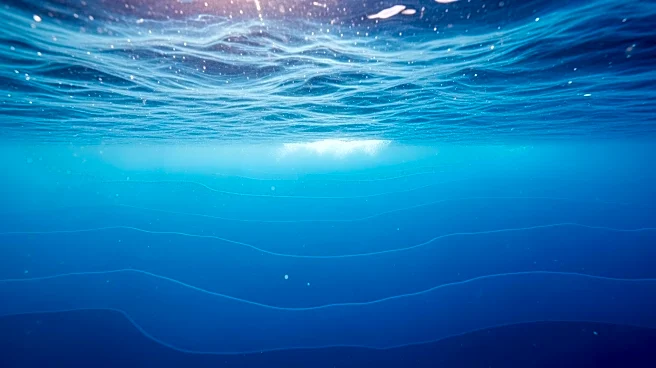What is the story about?
What's Happening?
Recent research published in Geophysical Research Letters emphasizes the critical role of ocean stratification in the potential reversal of Antarctic sea ice loss. The study, led by Sirui Li from the Ocean University of China, utilized climate model experiments to explore how different levels of ocean stratification affect sea ice recovery under various carbon dioxide emission scenarios. The findings indicate that strong initial stratification in the Southern Ocean can trap heat near the surface, inhibiting ice formation and accelerating melting. This creates a feedback loop that could persist even if carbon dioxide levels are reduced. Conversely, weaker stratification allows for deeper heat mixing, promoting ice recovery. The study underscores the importance of understanding ocean layering dynamics to predict and potentially reverse sea ice decline.
Why It's Important?
The implications of Antarctic sea ice loss extend beyond regional impacts, affecting global climate, ocean circulation, and sea level rise. Sea ice plays a crucial role in reflecting solar energy, and its reduction leads to increased ocean warming, further exacerbating ice melt. This process, known as the ice-albedo feedback, can accelerate the melting of ice shelves, contributing to sea level rise. Additionally, sea ice supports unique ecosystems, and its loss poses risks to biodiversity. The study highlights the need for improved monitoring of ocean stratification and its influence on sea ice dynamics, which is vital for developing effective climate mitigation strategies. Understanding these processes is essential for policymakers and climate modelers to address the challenges posed by climate change.
What's Next?
The researchers advocate for enhanced observations of ocean stratification, including high-resolution measurements of subsurface temperature and salinity around Antarctica. Improved monitoring of meltwater fluxes, wind patterns, and ocean-atmosphere interactions is also recommended. These efforts aim to refine climate models and better predict future sea ice conditions. Policymakers are encouraged to prioritize carbon dioxide reduction efforts to prevent the ocean's stratification from reaching a point where sea ice recovery becomes difficult. The study suggests that timely action in reducing emissions and understanding ocean dynamics could make the reversal of sea ice loss feasible.
Beyond the Headlines
The study's findings highlight the complex interplay between ocean stratification and climate change, emphasizing the need for a holistic approach to climate science. The research suggests that addressing sea ice loss requires not only emission reductions but also a deeper understanding of oceanic processes. This underscores the importance of interdisciplinary collaboration in climate research, integrating oceanography, atmospheric science, and ecology to develop comprehensive solutions. The study also raises ethical considerations regarding the responsibility of global actors to mitigate climate impacts and protect vulnerable ecosystems.















